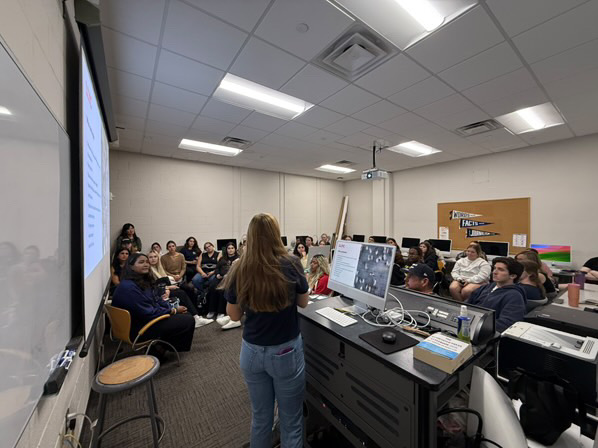A call for change: Student Activities Funding Board
Denied: a devastating verdict several Oakland University student organizations have received upon applying for funding through the Student Activities Funding Board (SAFB) this past semester.
Funding denials, regardless of reason, have left student leaders feeling discouraged. United by their experiences with SAFB, these student organization members and advisors have decided to break their silence, calling for increased support and accessibility whilst seeking funding.
What is SAFB?
SAFB is a Student Activity Fund Assessment Committee (SAFAC) organization, with the mission to assist students in implementing and developing activities to benefit the entire OU student body. The stated goal of SAFB is to help student organizations achieve their goals.
As with all SAFAC organizations, SAFB funds come directly from student tuition and receive a percentage of a pool divided between the eight orgs. SAFB and the Student Program Board (SPB) receive the highest portion of funding, each receiving 27% of the total available funds. This is in contrast to organizations such as The Oakland Post and Club Sports, which receive an allocation of 7.0% and 6.0% respectively.
SAFB financial records are not readily accessible to the public via SAFB’s GrizzOrgs page. To obtain this information, students are expected to attend OU Student Congress (OUSC) General Body meetings on Friday evenings, which many argue is not a feasible option for all students. Alternatively, individuals may contact SAFB directly via email [email protected].
The current SAFB chair, Maris Ferguson, recognized this problem and is working diligently to make these financial records standardized and accessible to all. Previous SAFB administrations failed to keep meticulous documentation, which sparked Ferguson’s tenacity for clear record-keeping.
Student organizations can request funds from SAFB using the Finance feature on GrizzOrgs 2-4 weeks prior to the date the purchase is needed. The individual filling out this request must provide a description of what they are purchasing, the exact cost of the purchase and additional documentation, as needed.
At the end of each funding period, a SAFB representative reaches out to organizations with unused funding to remind student leaders of the funding opportunity.
Current numbers
SAFB has a total balance of $558,917.99 as of March 31. This is in strong juxtaposition with SPB whose account balance sits just above $200k. With such a large accumulation of funds, some question why a larger proportion of SAFB money is not being utilized to benefit the student body.
Ferguson agreed that this amount of unused funding is quite large, but highlights that the SAFB spending depends on student organizations to request funds.
“My goal is to get the most funding out possible,” Ferguson said. “However, we are reliant on orgs to submit budget requests.”
Accessibility issues were brought up to Ferguson, pointing out that reasons students may not be requesting funding may be due to a lack of knowledge on how to submit requests and worries that their submissions will be denied.
Ferguson agreed with the existence of these barriers, and as she moves into the role of OUSC Vice President for the 2023-24 school year, promises to work diligently to make funding more easily accessible for all students.
In deficit
Cameron Roach, president of the Honors College Student Association (HCSA) has felt the frustration of falling into deficit firsthand, after an issue that caused his club’s SAFB-approved food order to be charged tax, wherein OU spending is tax-exempt. This mistake sent his club in the negative, by $7.12.
“Despite the mistake not being our fault, SAFB said they could not cover that $7.12 for us; instead, they suggested the only solution would be to pull from our organization’s flex account,” Roach said. “I stood my ground at first, but I ended up using our club’s personal finances to cover the deficit because we would not be able to request SAFB funds for future events otherwise.”
This issue was very unfortunate in Ferguson’s eyes since neither SAFB nor HCSA was at fault.
“The HCSA incident was a difficult situation, but it led us to come up with a great solution,” Ferguson said.
Ferguson worked alongside OUSC leaders to create a “deficit forgiveness” policy for student organizations. Now, organizations with deficits under $50 may apply to SAFB for forgiveness. Ferguson suggested that these applications will be approved rather liberally to reduce financial barriers to access.
Discretionary funds
Lauren Taylor, treasurer of the Pre-Law Club, was eager to distribute free LSAT study resources to students. One of the club’s main commitments is to ensure equitable access to law school for students of any socioeconomic status.
Each year, the club requests a sum of money for the LSAT materials under SAFB’s discretionary funding, which allows student organizations to purchase items that did not fall within the standard categories of conference registration, equipment, giveaways and food.
This past summer, the current SAFB administration decided to take discretionary funding away. SAFB advisor, Aidee Jiminez Breton, suggested that the reasoning for nixing discretionary funds was to allow for increased transparency and more oversight of club spending. Ferguson also points out that the discretionary funds were recategorized for simplicity, meaning more money was added to the other categories.
While these objectives are seemingly well-intentioned, rescinding discretionary funds has inhibited the Pre-Law Club from providing equitable access to educational resources.
“I was a bit disappointed to hear that the only way to purchase the materials with SAFB funding was by arguing that the study books could be considered equipment,” Taylor said. “If we manage to get our request approved, students would have to rent out the study resources for a limited period of time.”
The OU Pre-Law Club’s dilemma shines a light on an expansive issue as many student organizations struggle to function without the option of discretionary funding.
Ferguson recognized the loss of discretionary funding may have spurred difficulties for some groups. With that being said, she encourages organizations to directly contact the board with these unique challenges. She emphasizes that the role of SAFB’s Special Projects Fund is to address situations where the request may not fit neatly within the boundaries of the standard funding categories.
By the letter of the law
As president of the H.O.M.E.S organization, Ferguson knows how important it is that funding is accessible because it is vital to keeping student organizations alive. However, she points out that it is integral to keep all organizations on an equal playing field, so organizations doing their due diligence can receive the funding they deserve.
With this mindset, SAFB carefully follows its bylaws when making funding decisions. However, multiple sources point out that the board does have the ability to practice discretion when reviewing budget requests.
“The current SAFB administration seems to want to adhere strictly to the policies and procedures,” Breton said. “However, they have the power to be flexible with student org funding and make exceptions if they wanted to.”
Breton suggested that while the SAFB administration may be closely following the letter of the law, they have faced criticism for losing the “spirit” of the law in doing so.
Ferguson pointed out that the board is obligated to remain beholden to the approved by-laws created and amended by democratically elected student leaders.
“My goals are to increase funding student organizations may request and reach out to organizations that are struggling,” Ferguson said.
The chair balances the board’s rule abidance with recognition of human error. When an easily-remedied violation is made, SAFB sends the student who filed the request a return for follow-up. This means that the student leader will receive careful instruction on how to fix the issue before re-submitting the request.
Denials differ from returns for follow-ups, as they fully shut down the request. At this year’s OUSC Presidential debate, Ferguson pointed out that the SAFB denial rate sat at 17% this year.
Ferguson reasoned that all denials from this past year have been due to by-law violations. The diligent chair, who has read the SAFB by-laws dozens of times, recognized the need for simplifying the by-laws to ensure readability and consistency.
Reluctance to participate
The Meadow Brook Ball is one of Oakland University’s longest traditions. Although the event planning is extremely time-intensive, a typically secure aspect of the process is acquiring annual SAFB funding.
Despite being approved in past years, obtaining SAFB funding for the ball was much more arduous this year. A main problem SAFB had with the committee’s request was its allowance of outside guests and the ticket charges necessary to attend the event. The Meadow Brook Ball Committee eventually accepted financial assistance from SPB.
These difficulties in obtaining funding from SAFB echo the concerns of the general student body.
“I have had many students come to me worried about the future of their organizations because there is now a reluctance to step into the presidential and treasurer positions,” Jean Ann Miller, the Senior Director for the Office for Student Involvement, said.
While a revamped, mandatory training program for student organization treasurers was introduced this past year to simplify the process of requesting funds from SAFB, Miller’s statements suggest that club leaders may feel as if they do not receive adequate support beyond the training process. Miller highlighted that this perceived lack of support has caused an onslaught of students to become deterred from taking on organizational leadership roles.
“We hope to continue and expand org finance training in the future,” Ferguson said, recognizing that, while comprehensive in nature, the current training format may not be engaging for all learners.
Furthermore, Ferguson plans to modify the SAFB by-laws over the summer to reduce confusion. She encourages student leaders to contact SAFB directly with any questions they may have during the request process, vouching that the board is willing to support any student leader facing difficulties.
A call for separation?
These experiences highlight just a few of the many poor interactions student organizations have experienced when requesting funds from SAFB.
Service groups like Alternative Spring Breaks have been denied funding this year, along with educational clubs like Model United Nations, a group that was eventually provided funding after a lengthy appeals process. Long-standing traditions such as the Meadow Brook Ball and the annual Sigma Pi Pig Roast also had difficulties obtaining funding.
To clarify, all of the aforementioned organizations were denied funding due to by-law violations. Nonetheless, many of these denials took away (or almost eliminated) various academic, service and/or social events for OU students.
Ferguson highlighted that denying an organization funding is one of the hardest parts of her job. The chair recognized the importance of abiding by the by-laws but agreed that improvements to the funding process may be made.
It must be noted that SAFB does not operate independently. Rather, SAFB is a standing committee of OUSC, giving Congress the authority to appoint the chairperson of SAFB and allowing the OUSC President to function as an ex-officio member of the board.
These factors could allow members of OUSC to have influence over the decisions of the board and some believe the structure could potentially allow for conflict of interest situations to arise when individuals are members of OUSC or SAFB as well as a student organization leader. Because of these perceived structural issues, an array of student leaders are advocating for a full separation of SAFB and OUSC.
It is important to note that if a member of the funding committee is on the e-board for a club requesting funding, they are not allowed to partake in the voting process.
Ferguson stated during the vice presidential debate this current structure allows OUSC to hold SAFB accountable, and the two bodies could never be effective in functioning separately.
However, this may not be the case. Similarly to SAFB, SPB was also beholden to the OUSC in the past. When SPB separated from OUSC, the group thrived, utilizing its funds to give back to the student community and ensuring its hiring practices are merit-based.
Current OUSC President, Andrew Romano, does not believe that a full separation of OUSC and SAFB is possible, nor necessary. This is a topic Romano has a great passion for, as he personally wrote a bill advocating for the separation of OUSC and SAFB in the past.
“I wrote the bill my first year at OUSC,” Romano said. “It felt like a no-brainer.”
Romano then realized that OUSC provided an external check, a judiciary role of sorts, on SAFB. This would ensure that democratically elected student leaders remain in charge of appointing the SAFB chair and that regularly required financial reports to OUSC are made.
“While SPB is able to function well independently, that does not mean SAFB would be able to do the same,” Romano said.
The current OUSC President pointed out that SPB’s role is to plan events for all students, while SAFB’s role is to decide whether to provide financial support to orgs. In effect, Romano suggested that the current structure of SAFB allows students to retain a say in how their tuition money is being spent.
The debate over the separation of OUSC and SAFB has merits on both sides, with supporters and opponents coming from varying perspectives. While there is no clear consensus on this topic, SAFB leadership is willing to make positive progress in response to student concerns.









whatthewhat • Apr 13, 2023 at 7:45 AM
Wait a minute, is that the same Cameron Roach who presided as SAFB chair for several months… that seems like it would be an important disclaimer.
Cortez • Apr 12, 2023 at 3:34 PM
My student org had never had a problem, why weren’t orgs like us included in this article. This article Cherry picks and editorializes often. Yikessss
Cyndi • Apr 13, 2023 at 11:57 AM
When a newspaper reports on a car accident, do you expect them to interview motorists who weren’t in an accident?
Attacking the press is a despot move. Grow up and admit you botched SAFB.
Briana • Apr 12, 2023 at 12:55 PM
SAFB has a balance of ~$560k (!) yet Maris Ferguson contentedly presides over a denial rate of 17%? This is utterly egregious. This money belongs to students. It should be allocated to support student programming, full stop.
No amount of equivocation will change the fact that Maris’ incompetent stewardship of SAFB has harmed dozens of student organizations at a time when we’re desperately trying to rebuild. Disgraceful.
Jeff Thomas • Apr 11, 2023 at 4:53 PM
This is a well done explainer article on SAFB and the conundrum of them currently having an enormous balance, yet still not dispersing those funds to student orgs. Just strong reporting that I enjoyed reading. Really nice work from Payton and The Post researching the issue and publishing this.
As an alumni, I hope to see changes that facilitate SAFB doing a better job of getting these tuition dollars back into the hands of students via Grizz Orgs. Make no mistake, the longer those funds keep accumulating in that account, the more tempting it’s going to be for OU’s administration to try to seize those tuition dollars and repurpose them. For this reason, I encourage student leaders to act with urgency, get those funds out of that account and into the hands of student organizations that need them.
SAFB should not be separated from the oversight of democratically elected leaders in OUSC. It is critically important for the campus community that these SAFAC orgs stay in the hands of OU students. OUSC has authority endowed to them by OU’s Board of Trustees via their constitution that allows them to help provide oversight and support to other SAFAC orgs. I have faith that OU’s student leaders will come together and find a solution.